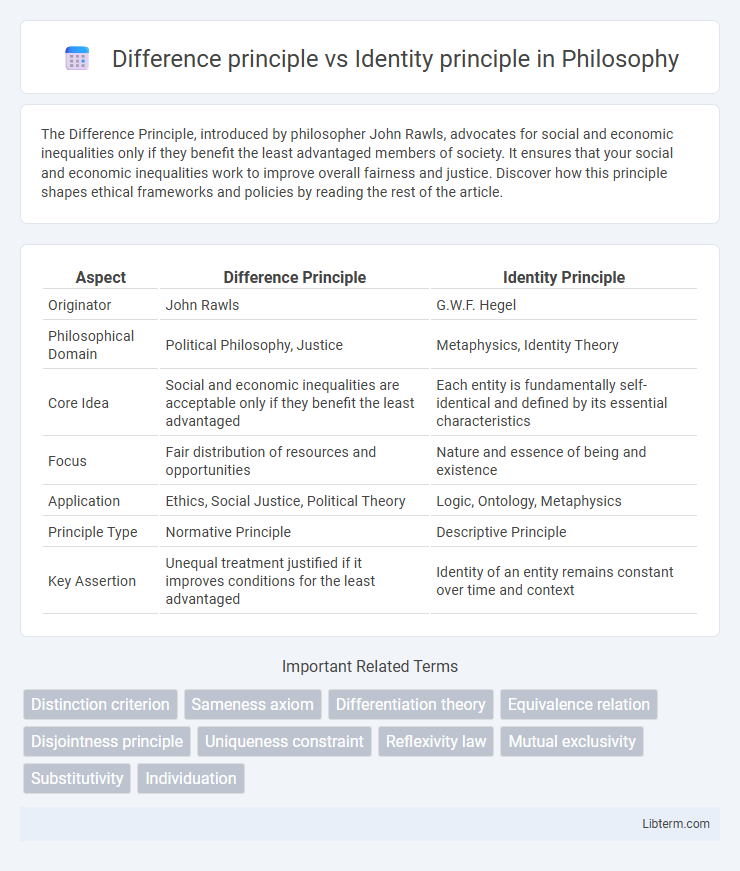The Difference Principle, introduced by philosopher John Rawls, advocates for social and economic inequalities only if they benefit the least advantaged members of society. It ensures that your social and economic inequalities work to improve overall fairness and justice. Discover how this principle shapes ethical frameworks and policies by reading the rest of the article.
Table of Comparison
| Aspect | Difference Principle | Identity Principle |
|---|---|---|
| Originator | John Rawls | G.W.F. Hegel |
| Philosophical Domain | Political Philosophy, Justice | Metaphysics, Identity Theory |
| Core Idea | Social and economic inequalities are acceptable only if they benefit the least advantaged | Each entity is fundamentally self-identical and defined by its essential characteristics |
| Focus | Fair distribution of resources and opportunities | Nature and essence of being and existence |
| Application | Ethics, Social Justice, Political Theory | Logic, Ontology, Metaphysics |
| Principle Type | Normative Principle | Descriptive Principle |
| Key Assertion | Unequal treatment justified if it improves conditions for the least advantaged | Identity of an entity remains constant over time and context |
Introduction to Difference Principle and Identity Principle
The Difference Principle, introduced by philosopher John Rawls, asserts that social and economic inequalities are justified only if they benefit the least advantaged members of society. The Identity Principle centers on the equal moral worth and respect for every individual, emphasizing fairness and impartiality regardless of social status. Both principles address justice but prioritize distinct aspects: economic equity for the disadvantaged versus inherent equality of all persons.
Defining the Difference Principle
The Difference Principle, formulated by John Rawls, prioritizes social and economic inequalities only if they benefit the least advantaged members of society. It contrasts with the Identity Principle, which emphasizes equality of outcome for all individuals. The Difference Principle justifies disparities as a means to improve the well-being of the worst-off group while maintaining overall fairness.
Explaining the Identity Principle
The Identity Principle emphasizes that individuals should be treated according to their unique characteristics, values, and identities, recognizing personal differences without forcing uniformity. Unlike the Difference Principle, which allows inequalities only if they benefit the least advantaged, the Identity Principle prioritizes authenticity and self-expression as fundamental to social justice. This approach fosters inclusion by honoring diverse identities, ensuring policies reflect varied needs rather than universal standards.
Historical Background of Both Principles
The Difference Principle, formulated by philosopher John Rawls in his 1971 work "A Theory of Justice," emerged during the rise of modern political philosophy emphasizing social justice and economic inequality. The Identity Principle, rooted in classical liberalism and dating back to Enlightenment thinkers like John Locke and Immanuel Kant, prioritizes individual rights and equality before the law. These principles reflect contrasting historical responses to questions of fairness and distribution within social and political contexts.
Key Applications in Logic and Philosophy
The Difference Principle, formulated by John Rawls, emphasizes social justice by allowing inequalities only if they benefit the least advantaged, serving as a foundation in moral and political philosophy debates about fairness and economic distribution. The Identity Principle, central to classical logic and metaphysics, asserts that each entity is identical to itself, underpinning arguments about object permanence, reference, and consistency in reasoning processes. Key applications of the Difference Principle arise in ethical decision-making and policy design, while the Identity Principle is crucial in formal logic systems and theories of personal identity.
Difference Principle in Ethics and Social Justice
The Difference Principle, formulated by philosopher John Rawls, asserts that social and economic inequalities are justifiable only if they benefit the least advantaged members of society, promoting fairness and reducing systemic disadvantages. In contrast, the Identity Principle emphasizes treating individuals equally and respecting their inherent dignity without preferential consideration based on social or economic status. The Difference Principle plays a critical role in ethical theories of social justice by prioritizing the improvement of conditions for marginalized groups, guiding policies that address inequality through redistributive mechanisms.
Identity Principle in Mathematics and Formal Logic
The Identity Principle in mathematics and formal logic asserts that every element is identical to itself, typically expressed as x (x = x), forming a fundamental axiom for equivalence relations and substitution in proofs. In contrast, the Difference Principle emphasizes distinguishing entities based on their unique properties or differences, but it lacks the foundational role in logical systems that the Identity Principle holds. Understanding the Identity Principle is crucial for defining equality, enabling expression simplification, and ensuring consistency within formal deductive reasoning frameworks.
Comparative Analysis: Core Contrasts
The Difference Principle prioritizes social and economic inequalities only if they benefit the least advantaged members of society, emphasizing distributive justice and equity. In contrast, the Identity Principle centers on recognizing and respecting individuals' unique identities and experiences, advocating for equitable treatment based on personal and group-specific characteristics. These core contrasts highlight the Difference Principle's focus on material outcomes versus the Identity Principle's emphasis on cultural and social recognition.
Implications in Contemporary Debates
The Difference Principle, formulated by John Rawls, prioritizes socioeconomic inequalities only if they benefit the least advantaged, impacting contemporary discussions on wealth redistribution and social justice policies. In contrast, the Identity Principle emphasizes equal treatment and non-discrimination based on inherent characteristics, shaping debates around affirmative action and equal rights legislation. These principles influence legislative frameworks and ethical considerations in addressing inequality and systemic bias in modern democratic societies.
Conclusion: Practical Significance and Future Directions
The Difference Principle emphasizes social and economic inequalities only if they benefit the least advantaged, promoting justice through equitable resource distribution. In contrast, the Identity Principle prioritizes individual identity recognition and respect, stressing social inclusion and personal dignity. Future directions involve integrating these principles to create policies that both reduce inequality and affirm individual identities, enhancing social cohesion and fairness in diverse societies.
Difference principle Infographic

 libterm.com
libterm.com